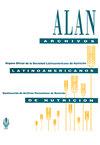Non-alcoholic beverage and fast-food consumption, among first- and fourth-year nursing students in Madrid
IF 0.3
4区 医学
Q4 NUTRITION & DIETETICS
引用次数: 0
Abstract
Sugar-sweetened beverages and fast-food consumption have been associated with non-communicable diseases. Objective. Was to analyze consumption of non-alcoholic beverage and fast-food consumption among first- and fourth-year nursing students. Materials and methods. A questionnaire-based survey was conducted among first-and fourth-year nursing students in Madrid, Spain. Anthropometric data (weight and height) and demographic data were collected, as were data on consumption of specific foods and beverages. Results. The survey was completed by 436 students. Mean (SD) age was 22.0 (6.8) years, 84.1 % of were women.26.2 % of the students were underweight; 6.3 % were overweight. Consumption of sugar-sweetened beverages and diet drinks was moderate. Slightly more than three-quarters of the students (75.5 %) purchased fast food in the previous month. Burger bars were the most frequently visited fast-food outlet (77.2 %). A direct relationship was observed between BMI and fast-food consumption (rho = 0.099; p = 0.042) and between BMI and consumption of diet cola or carbonated drinks (rho = 0.120; p = 0.013). Conclusion. We provide new epidemiological data from a specific university population that could be useful to promote more studies that help design appropriate strategies to increase a healthy lifestyle.马德里护理专业一年级和四年级学生的非酒精饮料和快餐消费
含糖饮料和快餐消费与非传染性疾病有关。客观的分析一年级和四年级护生的非酒精饮料和快餐消费情况。材料和方法。在西班牙马德里的一年级和四年级护生中进行了一项基于问卷的调查。收集了人体测量数据(体重和身高)和人口统计数据,以及特定食品和饮料的消费数据。后果这项调查由436名学生完成。平均(SD)年龄为22.0(6.8)岁,84.1%为女性,26.2%的学生体重不足;6.3%超重。含糖饮料和无糖饮料的消费量适中。略高于四分之三的学生(75.5%)在上个月购买了快餐。汉堡店是最常光顾的快餐店(77.2%)。BMI与快餐消费之间存在直接关系(rho=0.099;p=0.042),与无糖可乐或碳酸饮料消费之间存在密切关系(rho=0.120;p=0.013)。我们提供了来自特定大学人群的新流行病学数据,这些数据可能有助于促进更多的研究,帮助设计适当的策略来增加健康的生活方式。
本文章由计算机程序翻译,如有差异,请以英文原文为准。
求助全文
约1分钟内获得全文
求助全文
来源期刊
CiteScore
0.50
自引率
0.00%
发文量
31
期刊介绍:
Archivos Latinoamericanos de Nutrición (ALAN) is the official publication of the Sociedad Latinoamericana de Nutición (SLAN), for the dissemination of knowledge in the fields of food and nutrition, principally throughout the American Hemisphere. Articles in Spanish, English, Portuguese and French are accepted, both from the Society members and from nonmembers, in the following categories: 1. General articles (critical scientific reviews); 2. Research articles (originals); 3. Papers in applied nutrition (analytical results from intervention programs and discussion of reconmendations of practical application), and 4. Letters to Editor (short comments of general interest or about scientific facts and results previously published in Archives).

 求助内容:
求助内容: 应助结果提醒方式:
应助结果提醒方式:


